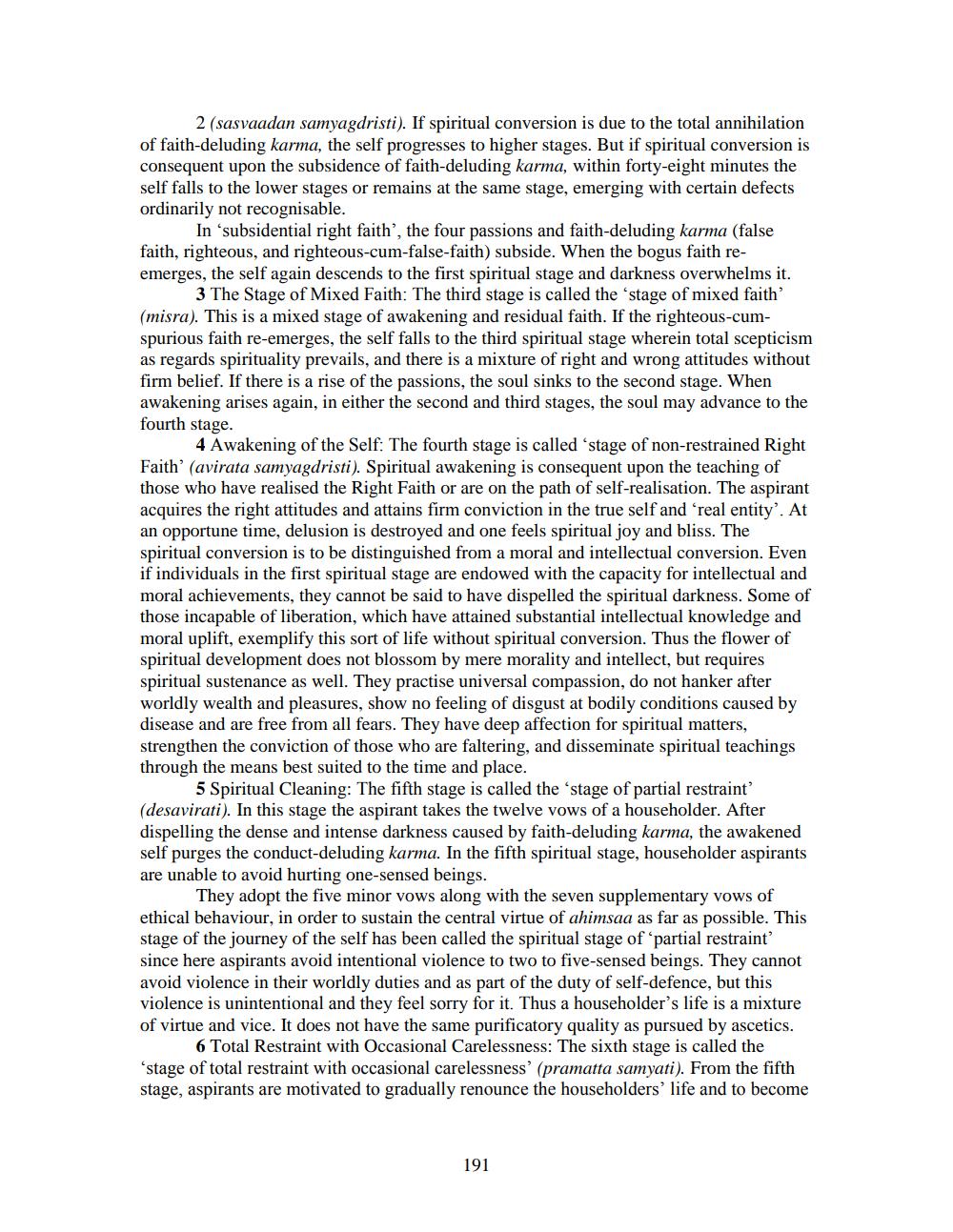________________
2 (sasvaadan samyagdristi). If spiritual conversion is due to the total annihilation of faith-deluding karma, the self progresses to higher stages. But if spiritual conversion is consequent upon the subsidence of faith-deluding karma, within forty-eight minutes the self falls to the lower stages or remains at the same stage, emerging with certain defects ordinarily not recognisable.
In 'subsidential right faith', the four passions and faith-deluding karma (false faith, righteous, and righteous-cum-false-faith) subside. When the bogus faith reemerges, the self again descends to the first spiritual stage and darkness overwhelms it.
3 The Stage of Mixed Faith: The third stage is called the stage of mixed faith (misra). This is a mixed stage of awakening and residual faith. If the righteous-cumspurious faith re-emerges, the self falls to the third spiritual stage wherein total scepticism as regards spirituality prevails, and there is a mixture of right and wrong attitudes without firm belief. If there is a rise of the passions, the soul sinks to the second stage. When awakening arises again, in either the second and third stages, the soul may advance to the fourth stage.
4 Awakening of the Self: The fourth stage is called stage of non-restrained Right Faith' (avirata samyagdristi). Spiritual awakening is consequent upon the teaching of those who have realised the Right Faith or are on the path of self-realisation. The aspirant acquires the right attitudes and attains firm conviction in the true self and 'real entity'. At an opportune time, delusion is destroyed and one feels spiritual joy and bliss. The spiritual conversion is to be distinguished from a moral and intellectual conversion. Even if individuals in the first spiritual stage are endowed with the capacity for intellectual and moral achievements, they cannot be said to have dispelled the spiritual darkness. Some of those incapable of liberation, which have attained substantial intellectual knowledge and moral uplift, exemplify this sort of life without spiritual conversion. Thus the flower of spiritual development does not blossom by mere morality and intellect, but requires spiritual sustenance as well. They practise universal compassion, do not hanker after worldly wealth and pleasures, show no feeling of disgust at bodily conditions caused by disease and are free from all fears. They have deep affection for spiritual matters, strengthen the conviction of those who are faltering, and disseminate spiritual teachings through the means best suited to the time and place.
5 Spiritual Cleaning: The fifth stage is called the stage of partial restraint (desavirati). In this stage the aspirant takes the twelve vows of a householder. After dispelling the dense and intense darkness caused by faith-deluding karma, the awakened self purges the conduct-deluding karma. In the fifth spiritual stage, householder aspirants are unable to avoid hurting one-sensed beings.
They adopt the five minor vows along with the seven supplementary vows of ethical behaviour, in order to sustain the central virtue of ahimsaa as far as possible. This stage of the journey of the self has been called the spiritual stage of 'partial restraint since here aspirants avoid intentional violence to two to five-sensed beings. They cannot avoid violence in their worldly duties and as part of the duty of self-defence, but this violence is unintentional and they feel sorry for it. Thus a householder's life is a mixture of virtue and vice. It does not have the same purificatory quality as pursued by ascetics.
6 Total Restraint with Occasional Carelessness: The sixth stage is called the "stage of total restraint with occasional carelessness' (pramatta samyati). From the fifth stage, aspirants are motivated to gradually renounce the householders' life and to become
191




